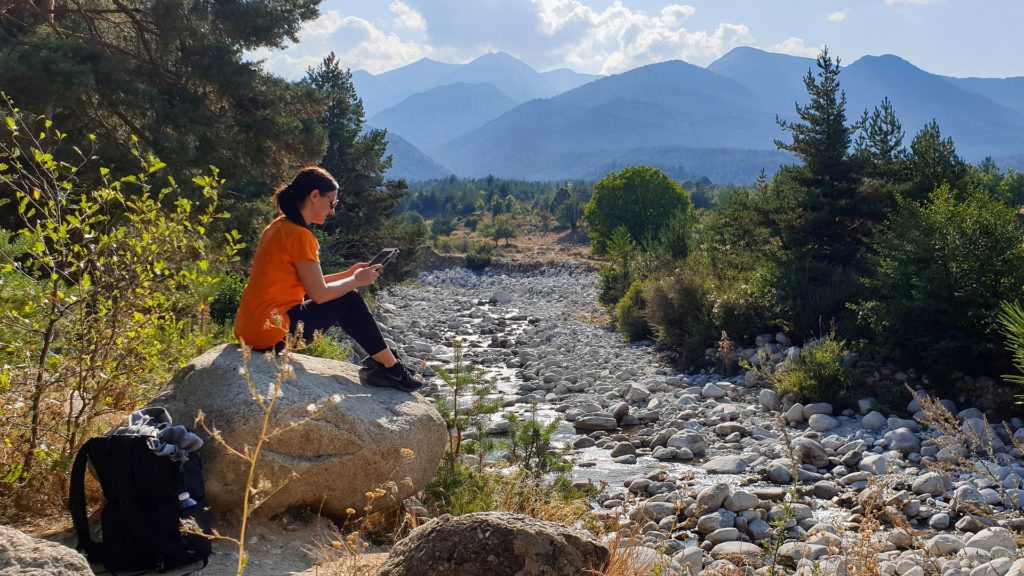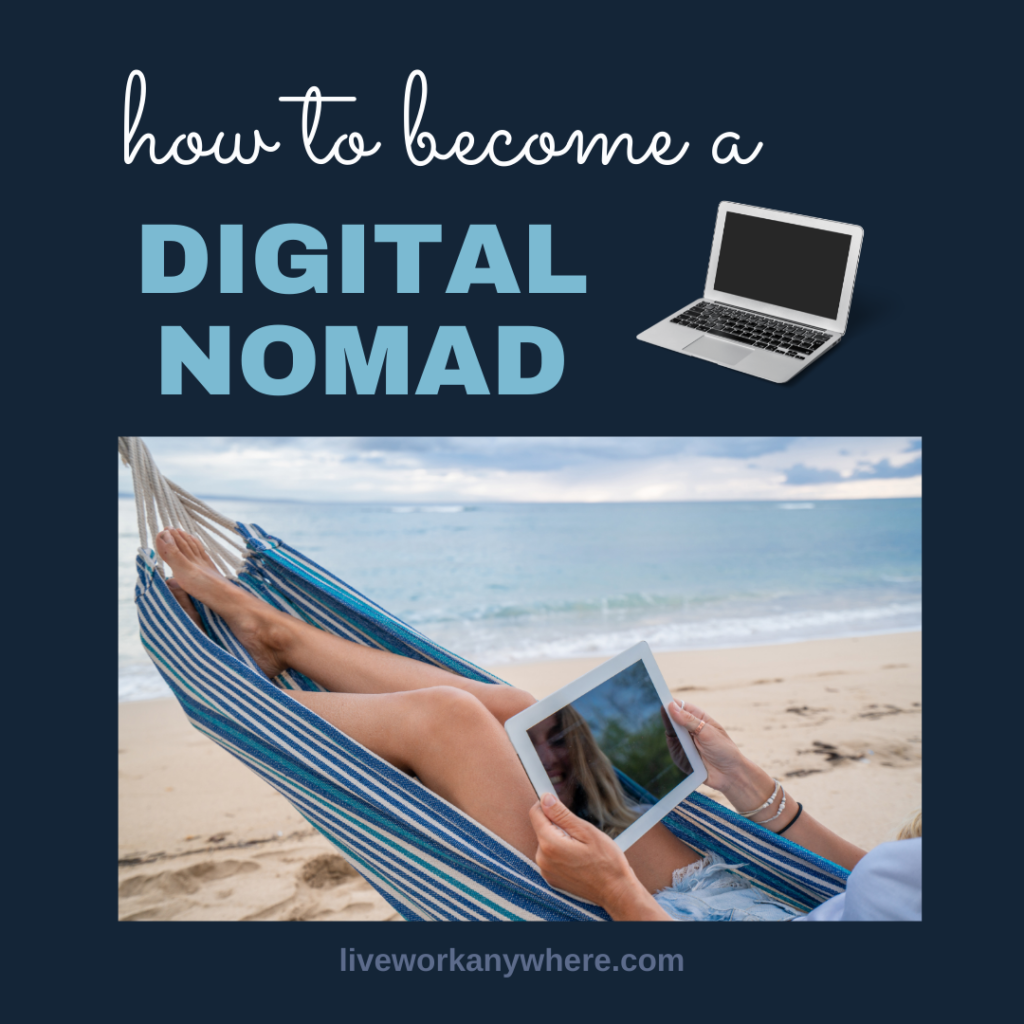Being on a beach and making money from a laptop is the dream of thousands of aspiring digital nomads. With just a laptop and an internet connection, digital nomads can work from anywhere in the world – whether they’re exploring Europe, soaking up the sun in Southeast Asia, or enjoying a coffee in a local cafe.
Of course, becoming a digital nomad is not as simple as packing your bags and saying goodbye to your cubicle. There are a few things you need to do before you can start living a digital nomad life.
Table of Contents
What is a digital nomad?
The best way to become a digital nomad is to first understand what it is and what it isn’t. Contrary to popular belief, being a digital nomad doesn’t mean working from a laptop on a beach somewhere and sipping cocktails (though that is certainly part of it). It’s actually a lot more than that.
A digital nomad is someone who uses technology to make a living, whether that’s through freelance work, online businesses, or some other form of income. The key defining factor is that they’re location independent, which means they can work from anywhere in the world.
Basically, a digital nomad is a term used for people who travel the world with a laptop and a backpack. It used to primarily mean young professionals and entrepreneurs who could up and leave, travel somewhere warm and inexpensive, and play geographical arbitrage with where to live/work.
But the truth is that anyone can become a digital nomad, even with no prior experience or skills. I started LiveWorkAnywhere in 2007 with the goal of figuring out how to become a digital nomad. I bought a one-way ticket to Costa Rica in 2009 and never looked back.
I learned the hard way, on low-bandwidth, shared Internet, and before smartphones existed. I want to help you navigate the hurdles I experienced and get you living the digital nomad lifestyle now.
We’ve come a very long way to 2022. Really, with high-speed Internet being abundant and everyone having a laptop and smartphone, there’s no excuse not to become a digital nomad. The only obstacles typically are planning and preparation, and taking the leap.
I still have the same mission – for every single person to be able to become a digital nomad and be location independent if they choose.
So if you’re curious about digital nomadism or want to become a digital nomad, here’s everything you need to know.
First things first – let’s start with the basics.
Who is a digital nomad?
The term “digital nomad” conjures images of 20-somethings working on their laptops from exotic beaches, but the reality is that anyone can become a digital nomad. As of 2022, almost half of digital nomads across the globe are in their 30s, with roughly 35% being in the 40-59 age group.
A digital nomad is simply someone who works remotely, without being tied to a specific location. This can be done by working for a remote company, or by running a location-independent business.
A digital nomad is someone who uses technology to work remotely, often from different locations around the world. This can mean anything from working on your laptop at a coffee shop in Paris to running a business from your RV as you travel across America. There are many benefits to being a digital nomad, including the ability to work from anywhere in the world and the freedom to create your own schedule.

The key defining factor of a digital nomad is that they have the freedom to work from anywhere in the world, as long as they have an internet connection.
Simply, it’s a person with a laptop who works online and has the freedom to be anywhere, anytime.
Digital nomadism is a rapidly growing lifestyle with more and more people looking to escape the traditional workforce and live a laptop lifestyle.
Before learning how to become a digital nomad, it’s important to understand the two types of digital nomads:
Type One: The digital nomad who wants to live the laptop lifestyle but also maintains a home base. They often have an apartment or condo in a city they frequently return to.
Type Two: The digital nomad who wants to travel the world and work from anywhere. They often have no permanent home base, living out of a suitcase most of the time.
The digital nomad lifestyle is not for everyone – it takes a lot of planning, self-discipline, and motivation. But if you’re looking for freedom, flexibility, and adventure, digital nomadism might be for you.
Here are some of the most common questions I get asked about digital nomads:
What are the pros and cons of being a digital nomad?
I’d love to tell you that being a digital nomad is all rainbows and butterflies. But, as with everything, you have to balance the good and the bad. Before you decide if you truly want to become a digital nomad, it’s crucial to know the pros and cons of the nomad life.
Pros of becoming a digital nomad
The digital nomad lifestyle is often romanticized as a life of constant travel and adventure. While it’s true that digital nomads do enjoy a great deal of freedom, there are also some very practical benefits to this lifestyle.
One of the biggest advantages is that it allows you to be with your family when they need you and without having to sacrifice your career. With traditional jobs, it can be difficult to take time off for family emergencies or even just for quality time together.
But with a digital nomad lifestyle, as long as you have a laptop and an internet connection, you can work from anywhere. That means that if your family needs you, you can be there for them without having to worry about work because of your location independence.
As for those with young children, you can even homeschool them while you travel the world and work remotely. So if you’re looking for a way to balance your career and your family life, the digital nomad lifestyle is an excellent option.
Another major advantage of being a digital nomad is the ability to make money from anywhere across the globe online – and, never have to stop exploring the planet. The digital nomad life is the perfect way to see the world and have amazing adventures while getting paid to do it.
Being a digital nomad means having a remote job, which allows you to live a nomadic lifestyle. That means you can move around and travel as you please.
Plus, you have the freedom and flexibility to work on your own schedule. You’re your own boss, so you can set your own hours and work as much or as little as you want.

One more benefit for digital nomads is that there’s no such thing as office politics. No more water cooler gossip, no more backstabbing colleagues, and no more worrying about what your boss thinks of you. No more having to tiptoe around the delicate egos of your co-workers or kiss up to the boss in hopes of getting a raise.
Of course, that’s not to say that there isn’t any politics in the digital world – after all, there are still plenty of people vying for attention and clients. But digital nomads are quick to point out that politics are very different when you’re not dealing with people face-to-face.
When you work online, though, it’s easier to focus on improving productivity, becoming more efficient remote workers, and honing their digital nomad skills to land highly coveted remote jobs.
Finally, the digital nomad life is often one of increased motivation and effectiveness their remote jobs. Whether it’s the stunning beaches of Bali or the rolling hills of Tuscany, there’s no doubt that working surrounded by natural beauty can be a huge boost to creativity and productivity.
Being able to work remotely means that nomads are not tied to one location and can choose to work from wherever they desire. This flexibility often leads to nomads seeking locations that offer stunning natural beauty, as the peaceful surroundings can help boost their innovative spirit and ingenuity.
After all, there’s nothing quite like working from a sun-drenched beach or a snowy mountain cabin to get the creative juices flowing.
Cons of becoming a digital nomad
The nomadic life isn’t for everyone. It isn’t all Instagrammable avocado toast and #wanderlust. In fact, most digital nomads eventually crumble under pressure and give up on their nomadic dream. For those who manage to stick it out, there are a few disadvantages to contend with.
First, there’s the matter of constantly being on the move. Remote work may be freeing in some respects, but it can also be exhausting. You never really get to put down roots anywhere, and you’re always saying goodbye to friends and colleagues.
Second, there’s the issue of isolation. Most digital nomads work remotely, which means they don’t have the opportunity to socialize with co-workers or meet new people on a regular basis. When you’re living out of a suitcase, it can be difficult to connect with people on a deeper level.
Third, it can be really tough to stay focused when you’re constantly on the move. There’s no such thing as a “normal” day when you’re a nomad, which can make it hard to stick to a routine or get into a productive flow state to quickly fulfill your remote job responsibilities.
Fourth, let’s not forget about all the logistical challenges that come with living a nomadic life – think finding a place to live and work that has good stable internet connection. Whether you’re working from a co-working space in Bali or your van parked in a campsite in Joshua Tree, reliable internet access is not always guaranteed.

This can make it difficult to stay in touch with family and friends back home, as well as stay on top of work deadlines. Living a nomad life often means having to deal with unreliable internet connections and a lack of reliable infrastructure.
Fifth, the nomadic lifestyle has a few hidden costs that can add up quickly, such as health insurance and travel expenses. You’ll need to find a way to pay for your own health insurance. This can be a challenge, as most traditional health insurance plans don’t cover nomads who are constantly on the move.
There are a few options available, such as nomadic insurance plans or international health insurance, but they can be expensive. Make sure to do your research before choosing a plan.
Finally, there’s the question of financial stability. For most digital nomads, being financial unstable is just a part of the package. Remote work gives us the freedom to pick up and move to wherever we want, but it also means saying goodbye to the stability of a regular paycheck.
Because when your income is derived from remote work, there’s always the possibility that you could lose your job or clients at any time. And even if you do have a steady stream of work, the nomadic lifestyle can be expensive, since you’re always on the move and often have to pay for things like accommodation and transport in advance.
So, if you’re thinking about becoming a digital nomad, just know that it’s not all glamping and yoga retreats. There’s a lot of hard work and uncertainty involved. For those who live nomadically, financial insecurity is just a fact of life. And that’s not necessarily a bad thing.
Sure, it can be scary not knowing how much money you’ll have coming in each month. But it also teaches us to be resourceful and budget carefully.
How to become a digital nomad: Where to start
There are a variety of ways to make money as a digital nomad. There are many online businesses that can be started with minimal investment. However, the first step is to figure out the path you want to take towards digital nomadism.
There are a few ways to become a digital nomad:
Path One: Quit your job and travel the world. This is the path I took and it’s not for everyone. It requires a high-risk tolerance. I tend to leap and then figure out the steps.
Path Two: Transition into digital nomadism gradually. If you’re not ready to quit your job, you can start by working remotely a few days a week. Once you’re comfortable with that, transition into working remotely full-time. You can kick off with a side hustle then move into that or ask your boss for a few days per week to prove you can be productive.
Requesting that arrangement from your boss shouldn’t be a problem. After all, the remote working trend is not new, and it appears to be taking off due to the changes caused by COVID-19.

In 2021, many companies are beginning to offer their employees a chance at permanently being able to do their jobs from home. In 2021, 42% of US employers report that their staff have to work from home. While we have yet to see permanent changes, 66% of the respondents are optimistic that remote work will become a fixture in time.
Path Three: Start a digital nomad business. This is the path most digital nomads prefer as it gives them the most flexibility and freedom. Actually, over 53% of remote workers point out that flexibility is the most highly appreciated perk they enjoy in being a digital nomad. You can work from anywhere, anytime, and don’t have to quit your job.
If you’re ready to take the leap and become a digital nomad, here’s a step-by-step guide to help you get started and give you an idea on how to become a digital nomad.
Step One: Plan Your Escape
The first step is to plan your escape. For the remote worker, the appeal of the digital nomad lifestyle is obvious: freedom. But with that freedom comes a great responsibility: choosing the right destination.
After all, not all remote-friendly destinations are created equal. Some offer access to fast internet and a vibrant community of other remote workers, while others are nothing more than a remote wasteland where you’ll be lucky to find a decent cup of coffee, let alone a strong Wi-Fi signal.
So how do you choose the right destination for your digital nomad adventure?
Some popular digital nomad destinations include:
For starters, there’s Bali. This Indonesian island is a mecca for remote workers, thanks to its laid-back vibes and idyllic setting. Bali has everything a digital nomad could want, from beautiful beaches to jungle trekking and amazing food. Plus, it’s relatively budget-friendly and easy to get around.
If you’re looking for a more urban experience, Taipei is quickly becoming one of the most popular digital nomad destinations in the world. There are plenty of coworking spaces and cafes where remote workers can set up shop, and the city is incredibly easy to navigate. And, thanks to its convenient location and relatively affordable cost of living, Taipei is an ideal base for exploring Asia.

Another popular digital nomad destination is Thailand, and it’s not hard to see why. The country has a great climate, friendly people, and plenty of remote work opportunities. Plus, it’s relatively inexpensive to live here, which is important for location-independent workers who need to watch their bottom line.
Meanwhile, remote workers who are looking for a change of scenery will find Puerto Rico appealing with its mix of sun, surf, and culture. Best of all, it’s relatively easy to become a digital nomad in Puerto Rico. There are no special visas or permits required, and the cost of living is relatively low.
Mexico is also a convenient destination for digital nomads who want to be close to the United States. With its close proximity, it’s easy to hop on a plane and head back to the States for a quick work trip or visit with family and friends. And, of course, Mexico is also a popular tourist destination, so you can enjoy all the benefits of living in a beautiful country with plenty of things to do and see.
Barcelona is another great destination for digital nomads. The city has a lively atmosphere and is packed with bars, restaurants, and cafes. There are also a number of coworking spaces that offer reliable internet connection, which makes it easy to find a place to work. In addition, Barcelona is well-connected, with excellent public transportation and an airport that offers direct flights to many European cities.
If you have no specific country in mind, you can start your search with the kind of accommodation you envision living in.
For example, what better way to achieve location independence than by living on a boat? While it may sound like a lifestyle reserved for the rich and famous, there are a number of affordable options for would-be digital nomads.
Houseboats, for instance, can often be rented for a fraction of the cost of an apartment, and many marinas offer special rates for long-term tenants.

If you’re a remote worker who wants to take the show on the road, there’s no better option than a yurt. These circular dwellings have been used by nomadic peoples for centuries, and they offer all the comforts of home while still providing a sense of adventure. Plus, they’re surprisingly easy to set up and take down, making them the perfect option for the digital nomad who likes to move around frequently.
Most importantly, yurts can be easily adapted to any climate, whether you’re looking to escape the winter cold or enjoy a summer in the mountains. So if you’ve ever dreamed of living a life of location Independence, a yurt just might be the perfect option for you.
Step Two: Quit Your Job (or transition into digital nomadism gradually)
If you’re ready to quit your job and become a digital nomad, here are the steps to take:
- Talk to your boss about working remotely. This is becoming more and more common as technology allows us to work from anywhere.
- Give notice and start transitioning into working remote a few days a week.
- Transition into working remotely full-time.
If you’re not ready to quit your job, you can transition gradually into digital nomadism by:
- Working remotely a few days a week.
- Taking vacation time to travel and work from different locations.
- Starting a digital nomad business.
Step Three: Earn income online
The next step is to generate revenue. There are a few ways digital nomads earn income:
- freelancing
- consulting
- online courses
- blogging
- affiliate marketing
Assess your skillset. What kind of work can you do online? Are you a web developer? A graphic designer? A writer? Once you know what kind of work you can do, start reaching out to clients and employers in your field. Many companies are now open to hiring remote workers, so don’t be afraid to ask around.
Find something you’re good at and start offering your services online. Once you have a few clients, you can transition into working full-time as a digital nomad.
Step Four: Get Organized
The next step is to get organized and start planning your travels. Where do you want to go? How long do you want to stay there? What are your accommodation and transport options? Once you have all the logistics sorted, it’s time to hit the road and begin your digital nomad life.
If you choose to become a digital nomad gradually instead of jumping right into it, make sure to set up a workstation in your house with a good internet connection, power outlets, and a comfortable chair.
Step Five: Hit the Road
Now it’s time to hit the road! Start by booking your flight and accommodation. Once you’re in your destination, start looking for co-working spaces, cafes with good WiFi, and places to stay.
How do I make money as a digital nomad?
The digital nomad lifestyle offers a lot of freedom, but it also requires you to be more organized and self-disciplined than the average person. If you can master those two things, you’ll be well on your way to becoming a successful digital nomad!
There are many ways digital nomads make money while they travel. The most popular include freelancing, consulting, online courses, blogging, and affiliate marketing.

Freelancing is a great way to make money as a digital nomad. You can work in a variety of industries and fields, from writing and editing to web design and development.
To get started, create a profile on a freelancing platform like Upwork or Fiverr. Then, start bidding on projects that interest you. Once you land a few clients, you can transition into working full-time as a digital nomad.
Consulting is another great way to make money as a digital nomad. If you have expertise in a particular field, you can offer your services to companies and individuals all over the world.
Another excellent way to generate income as a digital income is through starting a blog. You can monetize your blog through advertising, affiliate marketing, or selling digital products like e-books and courses.
Affiliate marketing is also a wonderful way to make money as a digital nomad. It involves promoting other people’s products or services and earning a commission for every sale you make.
To get started, sign up for an affiliate marketing program like Amazon Associates or CJ Affiliate. Then, find products or services that you believe in and start promoting them on your blog or social media channels.
How to earn passive income as a digital nomad
Passive income is the dream, particularly for a digital nomad – you never have to stop traveling. However, setting up passive income takes work.
As a digital nomad, an ideal way to continue funding this lifestyle is to generate passive income. This way, even when you’re not working, you can still earn money.
Investing in real estate as a digital nomad can be a terrific way to generate passive income. It’s the best way that I’ve found over the years to travel and have income. You can buy properties in desirable locations and rent them out to short-term tenants.
Or, you can purchase dividend-paying stocks and bonds or online real estate investment funds that will provide you with regular income payments.

Starting your own online business is also a fantastic way to earn passive income, as digital nomads often have a lot of flexibility in terms of what they can do. A survey among digital nomads worldwide in 2022 revealed that most are self-employed, with more than 65% owning their own business.
For example, you could start an online store that sells products related to your niche. Or, you could launch a blog and sell digital products like e-books and online courses.
There are many different ways digital nomads can generate passive income. By choosing a couple of methods that interest you, you can create a reliable stream of revenue that will help fund your travels for years to come!
If you’re interested in generating passive income as a digital nomad, I suggest checking out my guide on the best ways to do it.
How to find digital nomad jobs?
What are the best digital nomad jobs? Where can you find them?
There is no one-size-fits-all answer to these questions. The internet has opened up a whole world of opportunities for remote workers. With a little ingenuity and some hard work, it’s possible to find digital nomad jobs that offer the ideal blend of location independence, remote work, and decent income.
The best way to find these jobs is to start by looking at the skills that you already have. That is, the best digital nomad job for you will depend on your skillset, interests, and goals. Wondering where to begin?
To find remote job openings, start by searching job boards and websites that specialize in this sector. In the past, remote jobs were mostly reserved for highly skilled professionals with in-demand skills, such as software developers and designers. However, with the rise of the internet and the growing popularity of the digital nomad lifestyle, there are now a number of job boards that target digital nomad communities.
These job boards offer a wide range of remote jobs, from customer service and administrative positions to online marketing and social media jobs. Because they cater to remote workers, they often have a number of free resources online and tips for landing a remote job. If you’re interested in working online, be sure to check out one of these remote job boards.

Once you’ve found a few promising leads, it’s time to start applying. When applying for remote jobs, be sure that your profile matches the job description and highlight your digital nomad skills, such as the ability to work independently and manage your time effectively. With patience and effort, you can land the perfect remote job and start enjoying the freedom of working online.
While this digital nomad lifestyle has a lot of benefits, it can also be difficult to find steady work. That’s why I put together this guide on how to find digital nomad jobs. It features a list of skills, courses, and even personality traits to help you with your digital nomad journey.
The courses include suggestions for those just starting out, or you are already mid-career. You can choose a niche and become highly proficient in that niche.
What kinds of online businesses are best to start for digital nomads?
Digital nomads are a growing breed of entrepreneur. These remote workers are not tethered to a traditional office, and they have the freedom to work from anywhere in the world. If you’re a digital nomad, or if you’re thinking about becoming one, you might be wondering what kind of online business is best to start. Here are a few ideas to get you started.
There are many different types of businesses digital nomads can start.
A business you can jumpstart immediately is freelancing. If you have skills in writing, web design, social media marketing, or any other area, you can start offering your services to clients online. However, remote work is not for everyone.
If you’re the type of person who needs structure and support in order to get work done, then freelance remote work is probably not for you. You need to be able to motivate and organize yourself in order to be successful in this remote profession.

However, if you’re the type of person who thrives on independence and enjoys being your own boss, then remote work can be an excellent option.
You can offer your services as a virtual assistant. Also known as a VA, a virtual assistant is a remote worker who provides administrative, creative, or technical support to clients from a remote location.
Depending on the freelance clients’ needs, virtual assistants could oversee everything from social media management to graphic design to customer service. Versatility is key when it comes to being a VA. This is a great option if you’re organized, detail-oriented, and good at managing your time.
Another option is to launch a remote job board. This can be a great way to help businesses connect with talented workers from around the globe. To succeed in this business, you’ll need to have a strong understanding of the market. You’ll also need to put together an effective marketing strategy to reach your target audience.
One more excellent track for digital nomads is starting an online store. The internet has made it possible for anyone to become an online entrepreneur, and there are a number of platforms that make it easy to get started. However, there are a few things to keep in mind before you launch your e-commerce empire.
First, you need to choose a niche. What are you going to sell? For example, if you’re a travel blogger, you could leverage your own blog to sell travel guides or e-books on your website. Second, you need to decide how you’re going to fulfill orders. Are you going to dropship? Finally, you need to establish a remote work schedule and lifestyle that will allow you to run your business effectively.
Fortunately, there are a number of free resources online available to help you get started as a digital nomad. Once you have the basics down, you can start selling your products and services online with relative ease. You can sell physical or digital products related to your niche.
If you’re interested in becoming an online entrepreneur as a digital nomad, I suggest checking out my guide on the best businesses to start.
Where can I find digital nomad communities?
A full-time digital nomad can go anywhere. But, one of the biggest challenges digital nomads face is loneliness.
There’s no shortage of digital nomad communities out there. Digital nomad communities can be found all over the world, from the beaches of Bali to the streets of Berlin. You might say that there are too many of them!
There’s no one digital nomad community – they’re spread all across the globe. You can find digital nomads in big cities, small towns, and everywhere in between. There are even digital nomad communities in remote locations, like deserts and mountains. But don’t worry, we’re here to help you find the perfect one for you.
The first step is to decide what kind of community you’re looking for. Do you want a large, active community with tons of events and activities, or a smaller, more intimate group? There are pros and cons to both choices, so it’s important to decide what’s most important to you.

Once you’ve got a general idea of the kind of community you’re looking for, the next step is to start your search. The best way to find a digital nomad community is to search online. There are a number of online forums and groups dedicated to digital nomads, and many of them are very active.
You can also find digital nomad meetups in most major cities, and these are a great way to meet other digital nomads, gain new friends, and learn about the lifestyle.
Finally, if you’re traveling to a popular digital nomad destination, such as Bali or Chiang Mai, there are likely to be a number of digital nomad communities already established there.
For those who feel chained to their desk by the digital world, digital nomad communities may seem like a far-off dream. However, these digital oases are more common than you might think. Just a few of the most popular include:
- NomadBase: A digital nomad community located in Thailand that is open to digital nomads from all over the world.
- Nomad House: A digital nomad community located in Spain that offers temporary co-working space and lodging for digital nomads.
- The Dojo: A digital nomad community located in Bali that offers a variety of amenities for digital nomads.
So, whether you’re looking for online or in-person digital nomad communities, you should have no trouble finding what you’re looking for.
Digital Nomad Checklist: Guide to Freedom
The digital nomad lifestyle is one of freedom and flexibility, but it’s not necessarily an easy one. There’s more to it than just packing your laptop and heading off into the sunset.
In order to be a successful digital nomad, you’ll need to plan ahead and make sure you have everything you need to stay productive (and sane) while working remotely.

If you’re thinking of taking the plunge into the world of remote work, there are a few things you’ll need to check off your list first. Here’s a digital nomad checklist to help you get started:
A good laptop
This is pretty much essential for any digital nomad, so it’s non-negotiable. To find the best laptop for your digital nomad needs, it’s important to do your research.
Remember, not all laptops are created equal. While there are many great laptops on the market, some are better suited for digital nomads than others.
In general, digital nomads should look for laptops that can handle the demands of remote work, such as video conferencing and multitasking, and promise long battery life and a good selection of ports.
If you’re constantly on the go, you’ll want a laptop that’s lightweight and portable. But if you’re mainly working from coffee shops and co-working spaces, you might prefer something with a little more horsepower. And of course, price is always a factor.
It’s vital that you look for a machine that can handle all your work needs whether you’re a freelance writer, graphic designer, or web developer, there’s a laptop out there that will suit your needs. You’ll need something reliable to work on, after all!
A good internet connection
Digital nomads are a growing tribe of people who have embraced the freedom of working remotely. Whether it’s for a short-term project or an extended period of travel, digital nomads rely on portable wifi to stay connected and productive.
While the digital nomad lifestyle has its perks, it can also be fraught with challenges, particularly when it comes to finding reliable internet.
In fact, 65% of remote workers from the United States consider having a reliable internet connection as the leading concern when they’re choosing a destination or accommodation even just for short vacations trips.
Fortunately, there are now some great portable wifi options available for digital nomads, making it easier than ever to stay connected while on the go. Portable wifi hotspots offer a fast, reliable way to get online, whether you’re working from a coffee shop in Bangkok or a hostel in Rio de Janeiro.
Since they rely on cellular data networks instead of wifi hotspots, they’re much more reliable than relying on public wifi. Moreover, the fact that they’re small and lightweight makes them easy to take with you wherever you are in the world.
A place to live
For digital nomads, the world is their oyster – but finding a place to stay can sometimes be a challenge. Fortunately, there are a few great resources that can help digital nomads find housing in their next destination.
First, there are websites specifically devoted to digital nomad housing, like NomadBase and Roam. These sites offer a variety of options, from co-living spaces to private apartments, and they make it easy to find housing that fits your budget and lifestyle.

You can also try search engines like Booking, VRBO, and Airbnb, which often have an extensive selection of digital nomad rentals available for a few weeks or months at a time. Most digital nomads choose co-living spaces specifically designed for the digital nomad lifestyle.
Finally, don’t forget about good old-fashioned networking – tell your friends and family you’re looking for somewhere to stay, and they might be able to show you the ideal place to suit your needs.
A comfortable place to work
You’ll need to be comfortable working remotely. That means being able to stay focused and motivated without an office environment or set hours. You’ll need to find some remote work-friendly spots.
Coffee shops and libraries are always good bets. Some even enjoy working in hotel lobbies. But, co-working spaces are overall the best option for most digital nomads when it comes to remote work.
With the growing number of digital nomads, it comes as no surprise that there are also a growing number of coworking spaces that cater specifically to this group. These coworking spaces often offer features like fast Wi-Fi, plenty of outlets, and comfortable seating. In addition, some digital nomad coworking spaces provide amenities like bike storage, showers, and on-site cafes.
One great option is to search for digital nomad coworking spaces that offer a variety of seating options, like standing desks, lounge areas, and private meeting rooms. This way, you can mix up your workday and avoid sitting in the same spot for hours on end.
Another tip is to look for coworking spaces that have lots of natural light and plenty of outlets for charging your devices. And finally, be sure to check out the amenities offered and ensure they offer everything (or at least most things) you need.
Noise canceling headphones / earbuds
You’ll be spending a lot of time in coffee shops and co-working spaces, and trust me, you don’t want to hear your seatmate’s phone conversations. A pair of noise-cancelling headphones will come in handy, both for blocking out distractions and for making video calls in public places.
In picking what’s right for you, keep in mind that digital nomads need headphones that are durable and portable. We often work in coffee shops and other public places, so we need headphones that can stand up to a lot of wear and tear. Since the digital nomad lifestyle means being always on the go, we need headphones that are easy to pack and carry with us.
A sturdy backpack
For the digital nomad, a backpack is not just a fashion statement – it’s an essential piece of gear. After all, when you’re constantly on the move, you need to be able to pack light and stay organized. That means your backpack serves as your office, your bedroom, and your home away from home. So it’s important to choose the right backpack for the job.
First and foremost, it should be spacious and well-designed, with plenty of compartments for all your digital devices and cables. Second, it should be comfortable to wear, with padded shoulder straps and a hip belt that distribute the weight evenly. Finally, it should be stylish – because let’s face it, you’re going to be spending a lot of time in coffee shops and co-working spaces, and you want to look good while doing it.
A travel adapter
As a digital nomad, I’ve come to rely on my travel adapter to keep me connected while I’m on the road. Whether I’m working from a remote location or simply keeping in touch with friends and family, my travel adapter is an essential part of my kit.
If you’re going to be working from all over the world, you’ll need an adapter that can handle multiple types of plugs. After all, you can’t exactly do your work from a cafe if you can’t plug in your laptop!
Some adapters are designed to work with a variety of different electrical outlets, making them ideal for use in countries with diverse power standards. Some also usually come equipped with multiple USB ports, so digital nomads can charge all their devices at once. Many models even come with built-in surge protection, ensuring that delicate electronics are protected from power spikes.
A virtual mailbox
As a digital nomad, I often find myself on the move, with no permanent mailing address. And if you rely on friends or family to hold onto your mail for you, they might eventually get tired of playing postal worker.
Even if you have a forwarding address, it’s not always convenient to get to your mail in a timely manner. That can be a problem when it comes to things like bills, packages, and other mail. Fortunately, there’s a solution: virtual mailboxes.
A virtual mailbox is a digital service that provides you with a physical mailing address. This can be particularly helpful if you need to receive mail while you’re travelling.
Whenever you receive mail at that address, the virtual mailbox provider will scan it and send you a digital copy. You can then view and manage your mail online, and even have it forwarded to your current location.
Virtual mailboxes are perfect for digital nomads who need a reliable way to stay on top of their mail.
Communication apps
If you’re a digital nomad, chances are you’ve got a pretty good handle on remote work. But what about remote communication? Just because you’re not in the same physical space as your team doesn’t mean you can’t stay in touch and stay productive.
There are a number of great communication apps out there that can help digital nomads stay connected not only with their teams but with their family and friends back home as well.
Slack is a great all-in-one communication tool that can be used for everything from real-time chat to video calls. Zoom is another great option for video calls, and it’s especially handy if you need to share your screen or record a meeting. If you’re looking for something a little more low-key, consider using WhatsApp or FaceTime. If you need to collaborate on documents, Google Drive is an essential tool for digital nomads.

In today’s increasingly connected world, more and more people are choosing to become digital nomads, working remotely from wherever they happen to be. While this lifestyle comes with many advantages, it can also present some challenges, especially when it comes to communication.
Fortunately, there are a number of apps that can make it easy for digital nomads to stay in touch with colleagues, clients, and friends. If you need more help in choosing the best communication apps for your digital nomad lifestyle, you can check out this article.
Local sim card
Getting a local sim card is now less important if you have an iPhone or Samsung that has a T-Mobile plan. You can get off the plane, turn on your phone in 152+ countries, and it will work seamlessly.
However, there are still some great local sim cards if you want to save on rates and get a local number. Getting a local number is great for long-term travelers who don’t want higher phone bills, less data, and don’t want to rely on Facebook messenger, WhatsApp, and other apps to communicate while abroad.
If you do go the route of using your phone, there’s a trick I’ve used for years that still works to get a local US number while abroad.
Google voice
If you’re a digital nomad, Google Voice can be a lifesaver. It’s a US-based phone number that you can use while living abroad, and it’s perfect for keeping in touch with clients, family, and friends.
Here’s how to set it up:
First, create a google account if you don’t already have one. Then, go to Google Voice and click on “Create a new account.” Follow the prompts to choose your Google Voice number. You can select a number from any area code in the US.
Now that you have your Google Voice number, you can start using it right away. Simply give out your Google Voice number when someone asks for your phone number.
Prepare a Pre-Travel Checklist
For a digital nomad looking to go on a next adventure, it’s important to check out this pre-travel checklist before you hit the road. From ensuring that your laptop is backed up to packing your nomad essentials, this checklist will help you make sure that you’re prepared for anything.

First and foremost, be sure to back up all of your important files before you leave. Whether you’re working on a new website or just have some photos that you don’t want to lose, backing up your files will give you peace of mind while you’re traveling. You can use an external hard drive or cloud storage service like Dropbox or Google Drive.
You should also make sure your passport is up to date and that you have all the necessary visas for your destination. Don’t forget to make copies of all your important documents, organize your finances, and set up a budget for your trip. This will help you avoid any unwanted surprises later on. Look into travel insurance to protect yourself from any potential risks as well.
To ensure you have everything you need, check out this full digital nomad pre-travel checklist.
Conclusion: Is Being A Digital Nomad Worth It?
For the longest time, the traditional 9-5 office job was the only way to make a living. But in recent years, that’s started to change. Thanks to the internet, more and more people are finding ways to make money online – and that’s led to the rise of the digital nomad.
So what is a digital nomad? In short, it’s someone who uses technology to work remotely, usually from a different location each day. That might mean working from a coffee shop in Madrid one day, and then from a beach in Bali the next.
These days, more and more people are opting to pursue the digital nomad lifestyle. There’s no doubt that the digital nomad lifestyle is alluring.
And who wouldn’t want to trade in their stuffy office and soul-sucking commute for a life of sunny beaches, tropical drinks, and working from wherever the wifi is strong? But is this idyllic lifestyle really all it’s cracked up to be? Is being a digital nomad worth it? That’s a tough question to answer.
Here’s the truth: The answer depends on what you’re looking for in life.
If you value freedom and flexibility, then the answer is probably yes.
If you’re looking for stability and security, then you might want to stick to the traditional 9-5 lifestyle.
If you thrive in adventures, you will be forever altered.
If you’re open to immersing yourself in new cultures and learning about how the rest of the world works, it’s absolutely worth it.
If you’re the kind of person who doesn’t want to be away from family and home, then this isn’t the best option for you.
If my family has a medical emergency, I get to go there right away with no questions asked and no restrictions to consider. Is that worth it? What’s the price or value of not being able to take care of your parents?
Being a digital nomad is the ultimate flexibility. To me, it’s worth it!
![How to Become a Digital Nomad & Live/Work from Anywhere [2022]](https://liveworkanywhere.com/wp-content/uploads/2022/04/how-to-become-digital-nomad.png)
